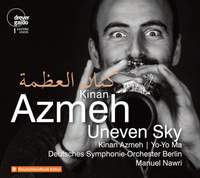Interview,
Kinan Azmeh on Uneven Sky
 Having appeared on several albums as a contributor, working with musicians such as Yo-Yo Ma and Daniel Barenboim, Damascus-born clarinettist Kinan Azmeh now makes two simultaneous débuts, as both soloist and composer. Alongside an hour of his own music, he presents clarinet concerti by three of his compatriots - Kareem Roustom, Zaid Jabri and Dia Succari.
Having appeared on several albums as a contributor, working with musicians such as Yo-Yo Ma and Daniel Barenboim, Damascus-born clarinettist Kinan Azmeh now makes two simultaneous débuts, as both soloist and composer. Alongside an hour of his own music, he presents clarinet concerti by three of his compatriots - Kareem Roustom, Zaid Jabri and Dia Succari.
I spoke to Kinan about how he makes his music, and about the pitfalls of musical Orientalism...
With Uneven Sky you’re presenting nearly an hour and a half of music from, or closely rooted in, Syria. Where did the idea initially come from to put this album together?
It may not seem like an obvious idea from the outside, but for me it’s the most natural out of all the albums that I’ve done. The album doesn’t announce itself on the cover as being “music from Syria”, because I wanted these pieces to become part of the repertoire, and not merely looked on as an exotic product. I’m from Damascus originally, though I’ve been living in New York for the past nineteen years, and I try to keep as connected with the Syrian musical scene as possible: I never wanted to become an “expatriate”. Between 2001 and 2012 I returned home regularly and got to know many Syrian composers, so this album is the result of many years of work.
As a classical clarinettist I commissioned a number of composers to write me pieces, which are on the second disc – Dia Succari, Zaid Jabri and Kareem Rouston. Kareem lives in the US, Zaid is mostly based in Poland, and Dia spent most of his life in France. The first CD is all works of my own for clarinet and orchestra – one of them features voice as well, and the last piece on the disc is a duo for cellist Yo-Yo Ma and myself, which we premiered at the Philharmonie in Hamburg about two years ago, in their opening season. I try to bridge different things in this album: one of them is me as a quote-unquote “classical” clarinettist, and then there’s the bringing of new music from Syria to the world, but also I’m wearing the hat of an improviser. Those three things largely summarise what I’ve been doing for the last twenty years – composing, improvising, and also performing works either written for me or from the broader repertoire.
One of the composers whose works you perform on this album, Kareem Roustom, has been succinctly described as “musically bilingual”. Would you say this also describes your own style as well?
I would certainly hope so. When people describe a musician as being bilingual or multilingual it’s great, but my goal is that when a clarinettist programmes one of these pieces, they don’t do so just because it’s linguistically “exotic”. There’s something closer to the heart than simply being bilingual: it’s not so much which musical language is used as how the music is used.
I grew up learning Western classical music, but in my own upbringing I never felt there was a borderline separating 'the East' from 'the West'; when people refer to a composer as 'bilingual', there's a risk of confirming that divide, whereas I would like us to think across it. For example, I’m currently working on a concerto that was written for me by a friend who is a composer from Sri Lanka, and it’s a mission for me to try to think vertically, to get as close as possible to the source.
Kareem Roustom is perhaps best-known as a film composer, rather than a writer of concert music; even his clarinet concerto bears a vividly pictorial subtitle. Do you feel there’s cinematic quality to this work?
Kareem is very knowledgeable about Arabic musical traditions, but he’s also trying to expand that - for example in using a very large orchestra and certain modal systems. He's also worked a lot in cinema, but what you see and hear in the pieces is something that can be greater than the sum of its parts. It can provoke images in the listener’s mind, but that’s what’s so exciting about the creative process: the most powerful part of composing and listening to music is that it triggers emotions that are more complex than we can experience in language, so even provoking a specific image can itself be limiting.
Music historians are fond of talking about “schools”, groupings of composers bound together by time, place and style. Would you say that there’s a unified Syrian “school” of contemporary classical composers represented by the composers (including yourself) featured on this album?
It’s a tricky question. Take the Mighty Handful in the Soviet Union, or Les Six in France, or the Viennese Schools: I don’t think the composers themselves decided to be part of a particular school, but rather that scholars who studied their works applied those labels later. Thinking of where we are in terms of the history of Syrian music, I think it will take us a while to see if there are any common threads between all these different works. Part of the research that I did for my doctorate was to explore the idea of identity that’s found among contemporary Syrian composers by analysing lots of chamber works, and sometimes there is evidence that there’s something tangible being formed right now. But it’s not up to me to pronounce that there is a ‘Syrian school’, and to decide who belongs within it! What I do know is that there is certainly an active music scene among Syrian composers – both those based in Syria and those living around the world - and my hope is that through this album these works will become more available, so maybe one day people will be able to come up with a grouping of this kind.
The first half of the album is given over to your performances of your own compositions. Can you tell us a bit about the influences you feel have shaped your musical style, and how you approach the writing of music with yourself as the intended performer?
That’s a very interesting question. I grew up playing Mozart, Brahms, Poulenc, Berg and other 'standard' Western classical repertoire, so I’m sure they are a big influence on what I enjoy. But I was exposed to lots of other music in Damascus – Arabic, Armenian, Kurdish and so on, and in addition to this I always enjoyed pop and electronica, including Michael Jackson and others. Now I think I follow one simple rule: I play what I like to listen to, and I always keep that in mind when I write, whether it’s for myself or for somebody else.
I always like to bring the element of improvisation into, or back into, the music. I think this is something that was lost somewhere along the line during the course of Western classical music’s history. Today we know Mozart as a composer, but back then he was a multi-instrumentalist, and even more importantly a wonderful improvisor. When I play the Suite for Improviser and Orchestra (which was not just written for a clarinettist – it can be played by any instrumentalist who has a good grasp of improvisation) there is an added sense of power and authority because I’m playing one of my own pieces, but I’m also equally happy for that authority to be claimed by another soloist. I keep this in mind when I’m playing my own pieces, but also when I’m playing the works of other composers. With a Mozart concerto, of course I’m faithful to the text, but equally I have to believe that this piece was written “by me” in some sense; you have to trust that it’s coming from your heart directly and not just reciting a text.
What’s exciting about playing your own pieces is the freedom that you can allow yourself. A lot of the time it becomes challenging – I’ve played the Suite for Improviser and Orchestra over two hundred times, so the challenge is to renew how I play it. Most audiences are hearing the piece for the first time, but trying to reinvent myself each time like this always keeps me on the edge of my seat.
Composer-performers are rarer in our time than they have been in the past; further back in history, the distinction vanishes altogether, but more recently most musicians have tended to be one or the other. Do you see yourself as a performer first, or a composer, or both?
I think I am both at once, but it depends on the context. When I play someone else’s piece I’m happy to wear the performer “hat”, but the fact that I’m a composer does inform how I play other people’s music. When I have the score in front of me, I’m always very interested to know why Brahms (say) chose this note rather than that note; if the soloist has the third of the chord at mf and everyone else is at mp, why does he do that?
As a performer, I try to know as many instruments as possible, because you need to master at least the principles of what’s doable and what isn’t. But when I’m writing for myself, I try not to think of my own limitations as a clarinettist; sometimes I write without using the instrument at all, because I don’t want to write things that I can play easily. This means I often end up writing music that is too difficult for me to play, but that’s the challenge!
But I do like the idea of the 'holistic' musician – this is a natural evolution. When I was a little boy I was 'the young clarinettist from Damascus'; then I grew up and I was 'the clarinettist from Damascus'; then I travelled in the countries around Syria and I was 'the Syrian clarinettist'; when I started to compose I became 'the Syrian musician', shifting from being just an instrumentalist to a larger musical identity. The next natural level of evolution is to become just 'the musician', because where you’re from geographically is not really that important. I remember talking to Yo-Yo Ma about this and he had a great follow-on to that; he said 'You know, Kinan, I think there’s a next degree of evolution: the next step you have to make is to switch from being a musician to becoming a human.'
Kinan Azmeh: Uneven Sky
Kinan Azmeh (clarinet), Bodek Janke (percussion), Hogir Göregen (percussion), Dima Orsho (voice), David Adorján (cello), Yo-Yo Ma (cello), Deutsches Symphonie-Orchester Berlin, Manuel Nawri
Uneven Sky is released on 5th April on Dreyer Gaido Records.
Available Formats: 2 CDs, MP3, FLAC
Sing Me Home is the latest album from Yo-Yo Ma with his country- and continent-spanning Silk Road Ensemble, featuring music from cultures and traditions stretching across the whole width of Eurasia. It was released in April 2016.
Available Formats: CD, MP3, FLAC, Hi-Res FLAC




